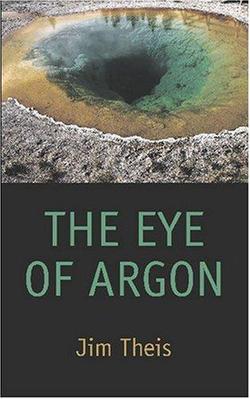A rogue is a person or entity that flouts accepted norms of behavior or strikes out on an independent and possibly destructive path.

Science fiction fandom or SF fandom is a community or fandom of people interested in science fiction in contact with one another based upon that interest. SF fandom has a life of its own, but not much in the way of formal organization.
Ulysses is one form of the Roman name for Odysseus, a hero in ancient Greek literature.

The Eye of Argon is a 1970 sword and sorcery fantasy novella by Jim Theis (1953–2002) that narrates the adventures of the barbarian Grignr. It has been notorious within the science fiction and fantasy fandoms since its publication, described variously as "one of [their] most beloved pieces of appalling prose," the "infamous 'worst fantasy novel ever' published for fans' enjoyment," and "the apotheosis of bad writing". Science fiction conventions have long held group readings of the work in which participants are challenged to read it aloud for extended periods without laughing.

Code or text folding, or less commonly holophrasting, is a feature of some graphical user interfaces that allows the user to selectively hide ("fold") or display ("unfold") parts of a document. This allows the user to manage large amounts of text while viewing only those subsections that are currently of interest. It is typically used with documents which have a natural tree structure consisting of nested elements. Other names for these features include expand and collapse, code hiding, and outlining. In Microsoft Word, the feature is called "collapsible outlining".
An atom is a basic unit of matter consisting of a nucleus within a cloud of one or more electrons.

Lee Hoffman, born Shirley Bell Hoffman, was an American science fiction fan, an editor of early folk music fanzines, and an author of science fiction, Western and romance novels.

Theodore Edwin White is an American science fiction writer, editor and fan, as well as a music critic. He writes and edits as Ted White. In addition to books and stories written under his own name, he has also co-authored novels with Dave van Arnam as Ron Archer, and with Terry Carr as Norman Edwards. He won a Hugo Award in 1968.

Notepad++, is a text and source code editor for use with Microsoft Windows. It supports tabbed editing, which allows working with multiple open files in one window. The program's name comes from the C postfix increment operator.
The Sir Julius Vogel Awards are awarded each year at the New Zealand National Science Fiction Convention to recognise achievement in New Zealand science fiction, fantasy, horror, and science fiction fandom. They are commonly referred to as the Vogels.
Sam, SAM or variants may refer to:
Fahrenheit is a temperature scale named after the physicist Daniel Gabriel Fahrenheit which is used in the United States.

The 59th World Science Fiction Convention (Worldcon), also known as The Millennium Philcon, was held on 30 August–3 September 2001 at the Pennsylvania Convention Center and Philadelphia Marriott Hotel in Philadelphia, Pennsylvania, United States.
William Bryan Dubay, also known by the pseudonyms Will Richardson, and Dube, was an American comic-book editor, writer and artist best known as editor and writer for Warren Publishing, including that company's horror-comics magazines Creepy, Eerie and Vampirella.
A securities turnover excise tax (STET) is a small tax on every stock, swap, derivative, or other trade. It has been levied historically in the United States and has been proposed more recently as a way to reduce speculation in financial markets.

Richard H. E. Smith II is a Chicago, Illinois- and Milwaukee, Wisconsin-based software engineer, computer consultant and a science fiction fanzine publisher.
This page is based on this
Wikipedia article Text is available under the
CC BY-SA 4.0 license; additional terms may apply.
Images, videos and audio are available under their respective licenses.







